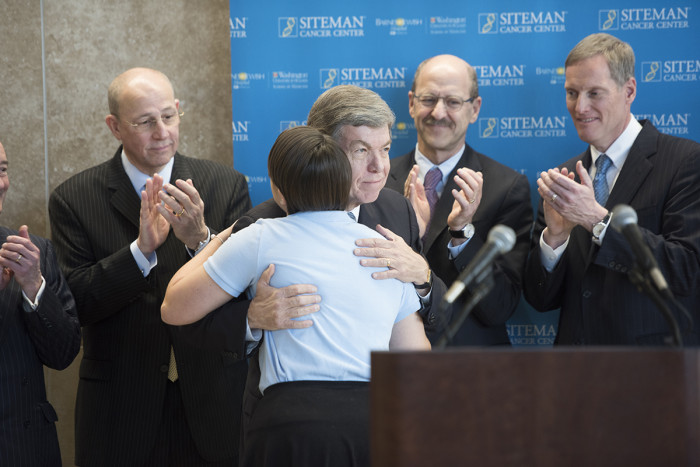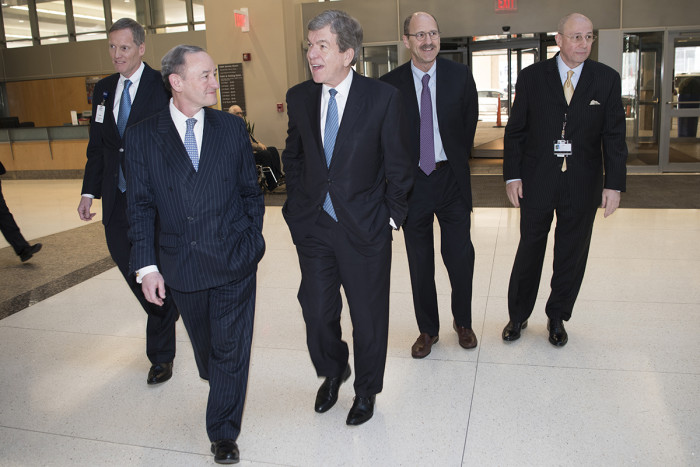Blunt visits Medical Campus to highlight increase in NIH funding
University leaders and U.S. Sen. Roy Blunt, R-Mo., celebrate a $2 billion increase in NIH funding
 Tim Parker
Tim ParkerU.S. Sen. Roy Blunt, R-Mo., hugs cancer patient Allison Johnson, of St. Louis, at a news conference Jan. 5 on the Medical Campus to celebrate a boost in funding for the National Institutes of Health (NIH).
Washington University leaders and U.S. Sen. Roy Blunt, R-Mo., celebrated a boost in federal research funding during a news conference on the Medical Campus earlier this month.
The gathering, held Jan. 5 at the Center for Advanced Medicine, highlighted a $2 billion increase in the National Institutes of Health (NIH) budget. The funding — which Blunt fought for in the recently enacted omnibus spending bill — amounts to a 6 percent increase over last year’s level and comes after years of stagnant NIH budgets.
A total of $32 billion for the NIH includes $5 billion for the National Cancer Institute, which is a 5 percent increase over last year’s level; a $350 million increase for Alzheimer’s disease research; $200 million for the Precision Medicine Initiative; $85 million for the BRAIN Initiative; and $303 million to fight antibiotic-resistant bacteria.
Blunt, who has paid several visits to the Medical Campus to meet with researchers, is chairman of the U.S. Senate Appropriations Subcommittee on Labor, Health and Human Services, and Education and Related Agencies, which has budget oversight for NIH.
“Those additional funds are incredibly valuable to those engaged in biomedical research, like Dr. Tim Eberlein and his fellow researchers and clinicians at the Siteman Cancer Center, and Dr. John Morris and his team at the Knight Alzheimer’s Disease Research Center,” Chancellor Mark S. Wrighton said at the news conference.
David H. Perlmutter, MD, executive vice chancellor for medical affairs and dean of the School of Medicine, thanked Blunt for being a vocal and visible leader supporting biomedical research. “Sen. Blunt has spent time at this medical center to discuss research and learn how new treatments are changing lives,” Perlmutter said. “He understands that the NIH is not just important to Missouri, it’s important to the health and well-being of all Americans.”
Blunt stressed the need to invest in scientific research.
“Biomedical research is essential to saving and improving lives, reducing health-care costs, growing our economy and maintaining America’s competitive edge in innovation,” he said. “Having met with leaders in the biomedical science field and learned more about the ground-breaking research that is underway, I know that we must maintain our commitment to providing the resources necessary to reach new frontiers in biomedical research and give hope to those battling disease.”
 Tim Parker
Tim Parker





